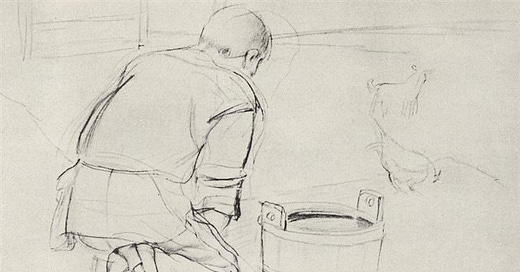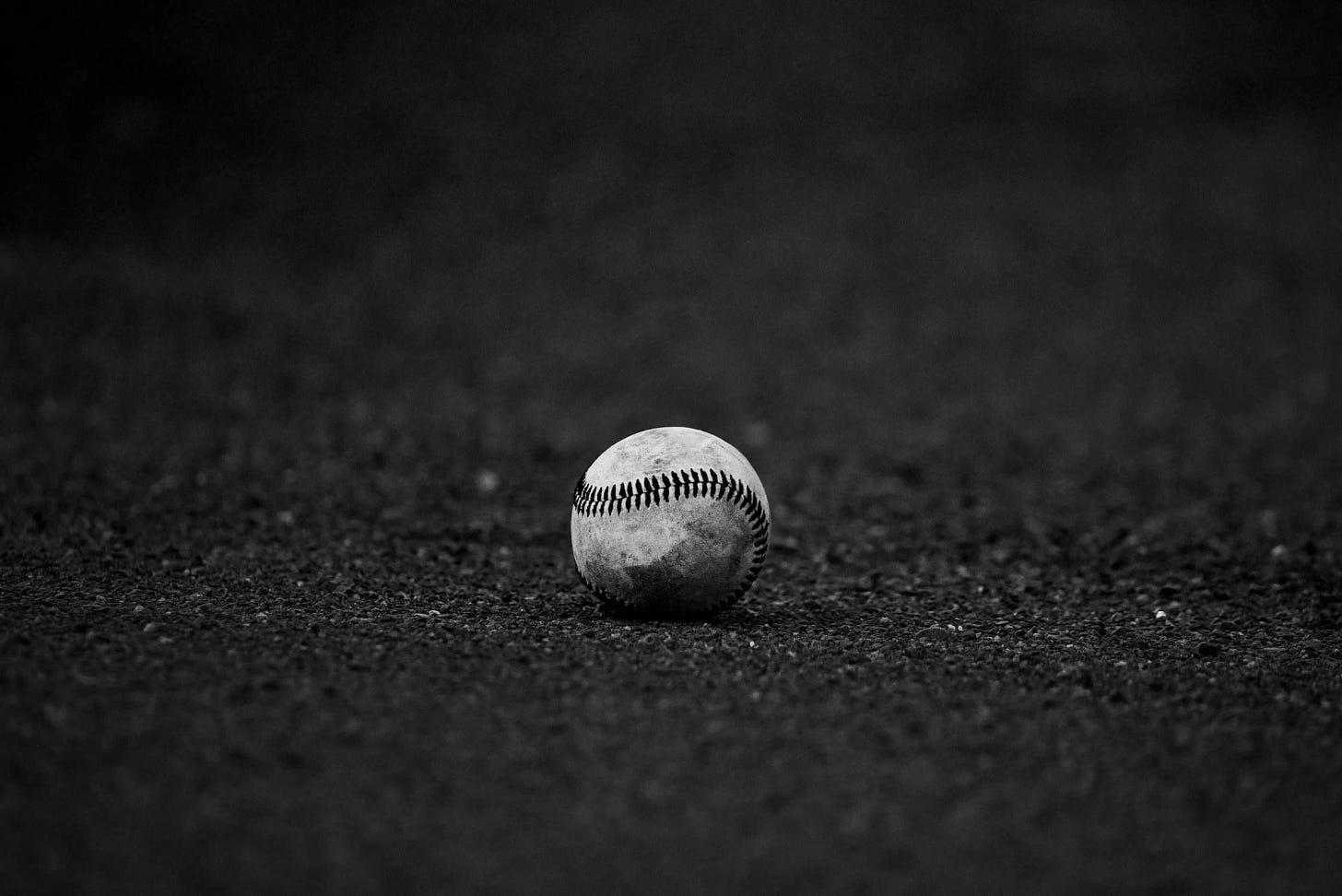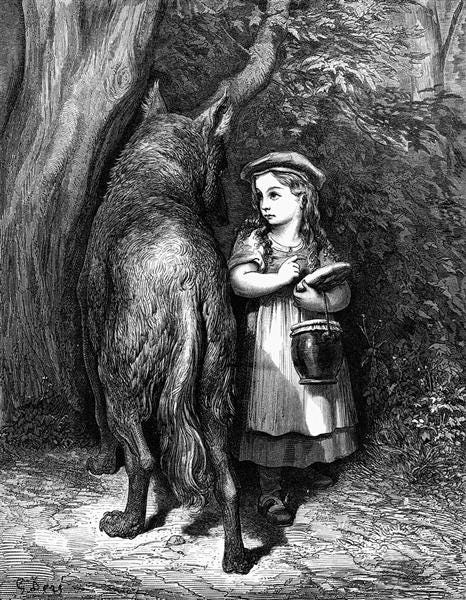Good (and Bad) Fathers: Six Perspectives on Fictional Fathers, for Father's Day
With contributions from Joel Miller, Shawn Smucker, Peco Gaskovski, Daniel McInerny, Andrew Campbell, and James Dietz
*Note: Be sure to click through to read this in your browser instead of in the e-mail, since this post is a bit too long for e-mail!*
Dear Friends,
When I was thinking through last month’s Mother’s Day post on fictional mothers, I had a great conversation with my husband, Chris, about the possibility of putting together a similar post about fathers in literature.
“Do you see fathers in literature in the same way that so many women seem to see mothers in literature?” I asked him. “Do you note and observe fathers in particular while you are reading?”
Men and women both can certainly identify with a wide variety of characters (of either sex) and topics in fiction, of course. It is also true, however, that one’s experiences as a man or woman can play a significant part in how one reads a particular piece of literature. So, following that conversation with Chris, in which I learned that, yes, he does think differently about father figures in literature than I do about mother figures (or indeed, than I do about father figures), I decided that what was really needed at the Hollow in June was a post about fathers in literature that was written by men.
I am so delighted to share that post with you today, offered with the generous collaboration of reader-writers , , , , , and . Their contributions on some of their favorite (or, in the case of the last contribution, some of the least worthy) fathers in fiction are insightful and moving. I hope you’ll find them fruitful reading as we approach Father’s Day, and perhaps will be inspired to take a deeper dive into one or two of the books mentioned here (or give a book as a gift this weekend)!
Enjoy!
—

Atticus Finch
In To Kill a Mockingbird, by Harper Lee1
My dad, a career-long high-school English teacher, introduced kids beyond counting to Atticus Finch from Harper Lee’s classic To Kill a Mockingbird. I’m privileged to say I was one of them. I’ve always regarded Atticus as the embodiment of wisdom, empathy, forbearance, and courage. As a father myself, I’m deeply impressed by how he models these traits for his grade-school children, Scout and Jem—particularly as a single dad, a role I unfortunately have some experience with myself.
In the language of modern child-development psychology, Scout and Jem show healthy attachment. They love and trust their father, even though they wrongly suspect he’s too old and infirm to do much; Scout regularly seeks solace in his lap. And Atticus knows exactly what each child uniquely needs. He engages Scout and Jem at their level but nudges them upward to maturity, explaining the world’s faults and fractures—including ever-present racial injustice—in terms they can understand.
He’s not perfect, of course. Sometimes Atticus can be too passive, too tolerant. As an attorney, he serves his town as a public defender. When the crotchety Mrs. Dubose hurls her racial invective at Atticus for defending Tom Robinson, a black man falsely accused of rape, Atticus urges Scout and Jem to cut her slack. While Jem’s initial reaction—destroying her prize flowers with Scout’s baton—requires correction, Atticus refrains from saying the obvious: that Mrs. Dubose’s opinions are hateful and wrong. Instead, he lionizes her bravery in kicking an accidental morphine habit.
Atticus’s passivity can undermine his parenting, as Scout and Jem struggle to square his tolerance with their neighbors’ bigotry. In fact, his reluctance to grapple with their dark side—understandably born of the need to exist alongside them—nearly gets Scout and Jem killed. Despite this lapse, which he admits, Atticus’s moral courage in the face of injustice creates the necessary example for Scout and Jem to embrace the shared humanity of all their neighbors.
— of Miller’s Book Review
“Papa”
In The Road, by Cormac McCarthy
Cormac McCarthy’s novel The Road is about a father and son trying to survive amid the ashen ruins of a post-apocalyptic America. The story is grim and at times terrifying, but by bringing us close to death, and keeping us close, it helps me remember why life matters, why hope matters, and why we need fathers to protect that life and hope.
The father in The Road is nameless, just “Papa”, and struggles to save his son from everything from starvation to being cannibalized by other people who are starving. His devotion to his boy is so great it rises to the spiritual: “He knew only that the child was his warrant. He said: If he is not the word of God God never spoke.”
In our own world, nearly a quarter of American children don’t have fathers, and fatherhood is often depicted as either harsh patriarchy or some version of Homer Simpson. The father in McCarthy’s story reminds me of a truer vision of fatherhood; of a man with fierce and sensitive faithfulness to his child, and crucially, a man who keeps his humanity in a fallen world, and in doing so, teaches his boy to keep his.
— Gaskovski of Pilgrims in the Machine. Peco is the author of the sci-fi dystopia novel Exogenesis (Ignatius Press).
Hugh Chance
In The Brothers K, by David James Duncan
When I was 10 years old, I remember resting on the living room sofa with my dad, and the topic came up of his childhood, what he had wanted to be when he grew up. His eyes went a little sad and he told me of his dreams of playing baseball, how good he was, but how he never had a chance—he was expected to work at a young age. And for a split second, I saw my dad as he must have been all those years ago.
This is why my favorite literary dad is Hugh Chance from The Brothers K, by David James Duncan. Hugh had a dream of being a ballplayer, was in fact a ballplayer, until a factory accident took away his thumb. But then an experimental surgery reawakens the dream, and he builds a long shed where he can practice pitching, and his four boys hide in the bushes and watch with great anticipation, this dream of their father’s coming back to life.
This is what my own dad gave me: the encouragement to trust, to try, to go after that thing I love. When I saw it in Hugh Chance, he quickly became a favorite character.
— of The Courage to Live It. Shawn and his wife, Maile, are the owners of the independent bookshop, Nooks.

Walter Younger
In A Raisin in the Sun, by Lorraine Hansberry
Walter Lee Younger ranks among the great American dreamers of literature, but unlike Jay Gatsby or Willy Loman, Walter finds his way to true freedom.
Toward the end of A Raisin in the Sun the devil comes to tempt Walter in the form of Mr. Lindner of the Clybourne Park Improvement Association. Mr. Lindner wants to buy back the home the Youngers bought in his all white neighborhood, but what is truly up for sale is Walter’s soul.
Walter is a husband and father that desperately wants the best for his family. That desperation has impoverished his vision of the good life. It’s become all about money, and he doesn’t have any. He sees where his life is headed, “a big, looming, blank space–full of nothing.”
Walter is prepared to make a deal with Mr. Lindner that will certainly destroy any dignity he has left. As his mother says, “Death done come in this here house.”
It’s not exactly clear how Walter changes his mind and decides to refuse the offer, but I think the answer lies in his family. As he recalls his family’s legacy of dignity, he calls to his son Travis to stand before him. Walter says, simply, “This is my son, and he makes the sixth generation of our family in this country. And we have all thought about your offer—And we have decided to move into our house because my father—my father—he earned it for us brick by brick.”
He isn’t merely speaking for himself. He’s become the voice of his family and the father his son needs, a man willing to hold to his integrity even when it’s unnervingly difficult, like his father before him. The money his father left him is gone, but something deeper and better remains. As the play ends, the Youngers still have trouble waiting for them, but they will be prepared to face it because of Walter’s courage.
Lavrans Bjørgulfsson
In Kristin Lavransdatter, by Sigrid Undset
“You [...] have so little understanding of the kind of man Lavrans is.”
Throughout Kristin Lavransdatter, Lavrans, Kristin’s doting father, never hides how much he loves his daughter. He plays with her, teaches her, and makes excuses to lavish presents on her. When people see his love and affection, they often assume those qualities imply weakness, unable to imagine firmness of will underneath his soft exterior. In the face of betrayal by his family and friends, this softness transforms into fierce love. Rather than righteously demanding retribution, his love offers forgiveness to those who have offended him, simultaneously showing a willingness to do whatever it takes to protect his family. Whether it be his daughter absconding with a profligate noble or his wife’s long-hidden secrets, he responds with love, a love of steel that meets the offenders but never bends. While he may be kind, he never lacks the courage to face the evil that threatens his loved ones “[He] would rather let steel be the judge between him and the man who ruined [his family’s] life.” In an age which often caricatures fatherhood, Lavrans offers a nuanced portrayal of both courage and tenderness.
— of The Classical Learning Digest
Spectacularly Bad Fathers
In modern fiction and drama
What is striking is how bad—often spectacularly bad—so many of the fathers are in modern fiction and drama. Jimmy Gatz’s ineffectual father in F. Scott Fitzgerald’s The Great Gatsby; the delusional Willy Loman in Arthur Miller’s Death of a Salesman; Charles Ryder’s mean-spirited father in Evelyn Waugh’s Brideshead Revisited; the pedophile Humbert Humbert in Nabokov’s Lolita; the unfaithful Harry “Rabbit” Angstrom in John Updike’s Rabbit novels; the manipulative and abusive David Melrose in Edward St. Aubyn’s Patrick Melrose novels; the near-bestial Culla in Cormac McCarthy’s Culla in Outer Dark; the ruthless Vito Corleone in The Godfather; the ideological Rayber in Flannery O’Connor’s The Violent Bear It Away.
Push back into the 19th century: how would you like to have Fyodor Pavlovich Karamazov for your father? The real villain of Pride and Prejudice is not Mr. Wickham, but the otiose Mr. Bennet. Emily Brontë’s Byronic Heathcliff is predictably destructive as a father. In Hamlet, the Ur-document of modernity, the image of fatherhood is appropriately split between Claudius, the false father-figure of the modern mindset, and Old King Hamlet, the true father-figure of medieval tradition, the like of whom Hamlet does not hope to look again.
But let us hope that as the arts of fiction and drama clamber out of the rubble of postmodernity, they will reactivate the image of paternal virtue abandoned by modernity.
— of The Comic Muse. Daniel is author of the novel, The Good Death of Kate Montclair (Chrism Press, 2023), and the scholarly monograph, Beauty & Imitation: A Philosophical Reflection on the Arts (Word on Fire Academic, 2024). His play, The Actor, about the subversive wartime theatrical activities of the young Karol Wojtyla (Pope John Paul II), will premiere at Christendom College (where he is associate professor of philosophy) in fall 2024.
Thank you so much to , , , , , and for their contributions!
I encourage you to check out their writing through their own Substacks, books, and essays, if you haven’t yet had a chance to do so.
Now, it’s your turn to comment:
What is your reaction to these introductions? Which character or book mentioned here intrigues you the most?
Do you tend to see yourself in characters in literature, or do you read more as an observer?
Who are your favorite father figures in literature? Whom would you add to this list?
Do you agree with that many fathers in modern literature are pretty rotten? Which bad fictional fathers would you add to the list?
It’s also worth mentioning that if you enjoyed this post, you will love our monthly Quick Book Notes series at the Hollow.
You can see about a third of each such post before passing beyond the paywall; please do consider becoming a paid subscriber for only one latte ($5) per month, if you are interested and able, in order to see all of our paid posts (at least two new ones per month!), to access our full archives, and to support Dixie’s AI-free writing.
Or please consider joining our free subscribers list!
We’d really love to have you!
Warmly yours,
Several of the links in this post are to my Bookshop.org affiliate store.












![[Image unavailable.] [Image unavailable.]](https://substackcdn.com/image/fetch/$s_!jxeC!,w_1456,c_limit,f_auto,q_auto:good,fl_progressive:steep/https%3A%2F%2Fsubstack-post-media.s3.amazonaws.com%2Fpublic%2Fimages%2F5deaa389-5dc5-4298-aaf4-4e9910b1d8e2_968x1200.jpeg)






What a fun read. I like the range of literary fathers written about, and the ways in which we can have both tenderness and strength as admirable virtues for fathers to possess. Another one I’d add-Silas Marner! Especially for any dads of adopted children he’s a lovely example, and shows just how much opening ourselves to self-sacrificial love for children can better us as just as we strive to better our children
I love this quote from Sarah Vowell in "Lafayette in the Somewhat United States," writing about how Lafayette left his pregnant teenage wife for an entirely optional American adventure:
“While history might be full of exemplary fathers, recorded history is not where to find them.”